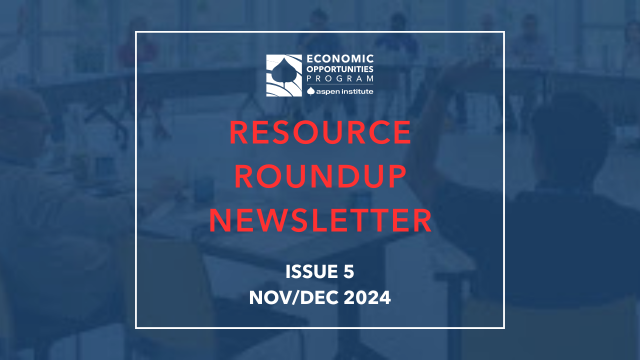Resource Roundup
Worker Power in a Changing Economy
Subscribe to Our Newsletter
Resource Roundup, by the Economic Opportunities Program, is an editorial take on the latest articles and reports that shape our thinking on economic opportunity.

Maxwell Johnson
Research Associate
The establishment of Labor Day as a federal holiday in 1894 cemented the place of organized labor in our national story.
Basic workplace rights, like the 40-hour workweek, overtime pay, the right to a safe workplace, and countless others, owe their existence to persistent advocacy and agitation by workers and their unions.
The majority of Americans believe that organized labor helps working people. But the labor movement is increasingly under threat. The current administration has moved to end worker safety programs, cut fair wage standards, and cancel collective bargaining agreements for hundreds of thousands of public employees.
This edition of Resource Roundup highlights unions’ role in improving the lives of working people and shows how states can embrace their role as laboratories of democracy by passing innovative policies that support organized labor. Learn how higher rates of unionization lead to less inequality and better wages for all workers. Then, read about how job quality in the meatpacking industry rose and fell along with the strength of unions. We close with an argument for shifting to sectoral bargaining, an approach that California is implementing for rideshare workers and one which can revitalize labor organizing.
Economic Policy Institute
Unions aren’t just good for workers—they also benefit communities and democracy
The benefits that unions bring extend far beyond individual workplaces and unionized workers.
In a new report, the Economic Policy Institute details research showing that increased union density strengthens job quality for all workers. States that have maintained relatively high rates of unionization have seen better wage growth, with workers capturing a greater share of gains from increased productivity. Unions also have been instrumental in the push to boost state minimum wages.
Read the full report here.
WTTW Chicago
The Union Stockyards: “A Story of American Capitalism”
Meatpacking once provided workers better wages than much of the manufacturing sector. But in recent decades, pay for those workers has dropped well below that of their peers.
The rise and fall of good pay in meatpacking is largely a story of unions. Union drives succeeded in organizing nearly all meatpacking workers by the mid-20th century. But today, fewer than a fifth of workers in the sector belong to a union. Facilities have moved from urban locations, like Chicago, to rural areas, and companies have hired heavily immigrant workforces, including refugees and those without legal status, that are vulnerable to exploitation by employers.
Learn more about the history of labor in meatpacking from WTTW.
OnLabor
Labor Day 2.0: Reviving Worker Power through Sectoral Bargaining
Federal laws supporting worker organizing have only become more restrictive since the passage of the National Labor Relations Act, during the Great Depression.
As a result, sectoral bargaining, which holds multiple employers to a collective bargaining agreement, has gained increasing attention as a way to modernize US labor law and strengthen the labor movement. Much of labor law is determined at the federal level. But in the absence of federal action, some states have experimented with wage boards and sector-wide standards for gig work.
Read about the promise of sectoral bargaining and what needs to be done to make it a reality in OnLabor.
Governing
California Will Revolutionize Rideshare Industry With New Union Policy
While the gig economy has meant greater flexibility for some workers, it has led to greater insecurity for others. The new arrangement of work has also proved a challenge to labor organizing, because gig workers are often labelled as independent contractors.
California recently made it possible for rideshare workers to bargain for a contract across the entire rideshare sector. The ability for the state to put in place sectoral bargaining for these workers comes from their contractor status. Federal labor law takes precedence over state law for workers classified as employees, but states are free to set standards for contractors. The approach offers a promising new way to improve jobs in an increasingly “gigified” workforce.
Learn how California is creating innovative labor policy in Governing.
About the Economic Opportunities Program
The Aspen Institute Economic Opportunities Program advances strategies, policies, and ideas to help low- and moderate-income people thrive in a changing economy.
Join Our Mailing List
To receive occasional emails about our work — including new publications, commentary, events, fellowships, and more — join our mailing list.
Connect on Social Media
For news and updates every day, connect with us on the social media platform of your choice.








